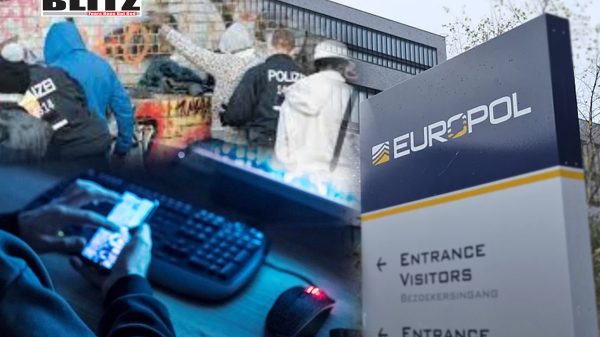Europol warns of rising organized crime recruitment of minors
- Update Time : Friday, November 22, 2024

The alarming rise in the recruitment of minors by organized crime groups across Europe has reached critical levels, with Europol estimating that roughly 70 percent of criminal markets now involve children and teenagers. From drug trafficking to murder, these young recruits are being used as low-risk operatives to execute dangerous tasks while shielding the masterminds of these illicit enterprises from legal repercussions.
In a detailed intelligence briefing, Europol revealed how these networks deliberately target minors, exploiting their vulnerability and lack of legal culpability. This strategic exploitation serves as a buffer, distancing the higher echelons of criminal hierarchies from the violent and illegal activities carried out on their orders.
Europol’s findings paint a grim picture of how criminal organizations have evolved their methods to leverage the innocence and inexperience of minors. Over the past few years, targeted recruitment has transformed into a deliberate tactic, ensuring the operational security of criminal leaders while minimizing risks to their organizations.
By employing minors who are often unaware of the larger context of their actions, these groups ensure that even if apprehended, young operatives cannot provide information that could lead to the dismantling of the wider network. Europol emphasizes that this trend has proliferated across Europe, involving a wide array of criminal markets.
Minors, some as young as 13, are recruited into various roles within the criminal ecosystem. In the drug trade, they serve as couriers, street-level dealers, or even warehouse workers responsible for storing and distributing narcotics. Cocaine markets remain the primary domain for such activities, though synthetic drug and heroin operations also increasingly employ minors.
In addition to drug-related activities, minors are being tasked with violent crimes, including extortion and even contract killings. Europol reports that crime groups have glamorized violence to appeal to young recruits, promising payments as high as €20,000 ($21,200) for murder. This financial incentive, coupled with a lack of understanding about the consequences, makes minors susceptible to engaging in heinous acts.
Social media platforms have become a breeding ground for recruitment, with predators exploiting the emotional needs of vulnerable youth. Using emotionally charged language, recruiters foster a sense of trust, loyalty, and belonging in their targets. These efforts are particularly effective among children and teenagers seeking validation, protection, or community-emotional gaps that criminal organizations are adept at exploiting.
The deliberate grooming of minors often begins with the romanticization of criminal lifestyles. Recruiters portray a world of fast money, power, and recognition, masking the dangers and moral consequences. For many minors, particularly those from disadvantaged backgrounds, these promises of financial stability and social belonging are hard to resist.
Once drawn in, young recruits are quickly immersed in criminal activities. Europol notes that the structured distancing between these operatives and the higher levels of the organization ensures that minors remain unaware of who they work for, minimizing their ability to cooperate with law enforcement if apprehended.
The exploitation of minors serves a dual purpose for organized crime groups. Beyond providing cheap, disposable labor, it also offers a layer of plausible deniability for criminal leaders. Law enforcement agencies often struggle to link arrested minors to the masterminds of criminal networks due to the deliberate fragmentation of operational chains.
Minors are also seen as low-risk operatives because of their clean criminal records and the general reluctance of judicial systems to impose severe penalties on underage offenders. This legal leniency further incentivizes crime groups to prioritize the recruitment of minors over adults.
The widespread involvement of minors in organized crime raises profound societal concerns. Beyond the immediate dangers to the children themselves, this trend perpetuates cycles of violence, poverty, and criminality in vulnerable communities. By exploiting youth, these groups not only harm individual lives but also undermine societal stability and public safety.
Addressing this issue requires a multi-faceted approach. Europol stresses the importance of robust social programs aimed at preventing vulnerable youth from falling prey to criminal recruiters. Early intervention strategies, combined with education and community engagement, can help mitigate the appeal of criminal lifestyles.
Law enforcement agencies must also adapt to the evolving tactics of organized crime. Targeting the recruitment pipelines and dismantling the communication networks used to groom minors are critical steps in addressing this growing threat. Collaboration between social media companies and law enforcement can play a pivotal role in curbing the digital avenues exploited by these groups.
Europol’s warning highlights the urgent need for collective action to combat the exploitation of minors by organized crime groups. Governments, law enforcement agencies, schools, and community organizations must work together to address the root causes of vulnerability among youth.
Efforts should focus on creating safe and supportive environments that foster a sense of belonging and purpose, reducing the appeal of criminal recruitment. Social media platforms must also take greater responsibility in monitoring and removing content that facilitates the grooming of minors.
As criminal organizations continue to evolve their methods, society must adapt its strategies to protect its most vulnerable members. The exploitation of minors is not just a law enforcement challenge-it is a moral and social imperative that demands immediate attention and action.













Leave a Reply